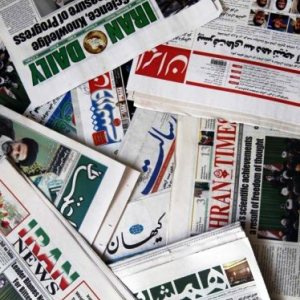Tehran’s Daily Newspaper Review

Now it’s time for the middle-class. Iran interviewed Minister of Housing Ali Nikzad, who promised that after the “successful” implementation of the Mehr Housing Project--which provided cheap housing developments for lower-income Iranian households--the government has drawn up plans to meet the demands of the middle-class. Gholam-Ali Haddad Adel, a man slighted by Mahmoud Ahmadinejad during his presiding over the 7th parliament, interviewed with Iran, amid rumors that he may return to the post now occupied by Ali Larijani, and stated that “Majles’ power could not stem from its confrontation with the government.” The front page also featured a critical headline targeting the parliament, reading “Majles poised to avert cash subsidies’ increase,” a promise made by Mahmoud Ahmadinejad and facing the outcry of many Principlists inside the Iranian parliament.
Jomhouri-ye Eslami also reported that the parliament may postpone the implementation of the second phase of the Purposeful Subsidies Plan until next summer. “The high vote I have received from people is an alarm for the exclusionists,” the newspaper quoted Ali Motahhari, Tehran MP and a vocal insider critic of the Principlist camp, who has not stopped attacking the hardliner members of the camp in recent months. Jomhouri-ye Eslami also spoke of a prospective ten-billion dollar revenue surplus for Iran in the following six months, as Tehran’s decision to ban oil exports to Europe has added twenty dollars to the price of every barrel of oil. Two headlines on the front page were allocated to Hashemi Rafsanjani, for whom the newspaper is a regular tribune. The newspaper’s editorial elaborated on the agenda which the Ninth Parliament should follow in what the newspaper described as “one of the most critical phases of the Iranian economy.”
Kayhan reported of a new bill approved by Majles--according to which Iranian citizens can submit lawsuits against foreign countries in domestic courts. “Sanctions against Iran have inflicted turmoil in the oil market,” Kayhan quoted Oil Minister Rostam Ghasemi, though Iran’s freeze of oil exports to France and the UK has not been Tehran’s favorite option, according to the minister.
“Officials appreciate loyal Iranian citizens,” Resalat quoted Ayatollah Mahdavi Kani, Head of the Assembly of Experts, the body in charge electing and monitoring the conduct of the supreme leader, as the parliamentary election turnout happened to be beyond estimations. The newspaper’s front page featured critical praise of Mohammad Khatami’s controversial voting on Friday, wishing that Khatami had abandoned his equivocal post-presidential election stance and convinced Mousavi and Karroubi to submit to the citizens’ votes. Nonetheless, the newspaper concluded that the former president’s voting proved that the enemy has failed to bait from “the Revolution Camp.”
After the Larijani brothers who have held key positions in the Islamic Republic’s political system, it seems that Daneshjou brothers are toeing the same line, albeit on a smaller scale: with Kamran as the Minister of Higher Education, Farhad taking helm of Iran’s largest academic institution (the Islamic Azad University) and Khosrow as deputy of research units of Azad university, higher education falls under the dominance of the Daneshjou brothers. Shargh also covered the recent disagreement between Iran and the IAEA watchdogs over a visit to the Parchin military base.
The editorial section of Iranian newspapers is not the work of the editor-in-chief or the senior editorial staff of the newspaper by default, but can be a contribution by experts and politicians (typically agreeing with the newspaper’s political stance.) The newspapers may also occasionally publish without an editorial.
Vatan-e Emrooz daily does not publish on Thursdays.
Trouble with understanding some terms? Check our Glossary of Iranian Political Terms.
Briefing
Iran is the official organ of the administration. Its current editor-in-chief is Ali-Akbar Javanfekr, former media advisor to President Mahmoud Ahmadinejad.
Jomhouri-ye Eslami (The Islamic Republic) was known as the official organ of the Party of the Islamic Republic, founded in 1979 and disbanded in 1987. Currently, it is an open critic of Mahmoud Ahmadinejad's policies and is known to be a mouthpiece of Akbar Hashemi Rafsanjani.
Kayhan (Universe) is a hard-line conservative newspaper. Its editor-in-chief –currently Hossein Shari’atmadari- is directly appointed by Iran's Supreme Leader. Shari’atmadari’s editorials often spark off controversy and debate inside Iranian political circles.
Resalat (Mission) belongs to the moderate wing of the Principlist camp. Resalat’s best known analyst is Amir Mohebbian, its political editor.
Shargh (East) is a moderate Reformist newspaper. It was the most popular and influential Reformist newspaper in its first period of publication which lasted from August 2003 until September 2006.
Tehran-e Emrooz (Tehran Today) is a “Principlist/Reformist” newspaper, connected to Mohammad Baqer Qalibaf, Tehran Mayor and a likely candidate of the 2013 presidential election.

